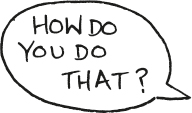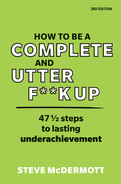Step
31
Don’t ask, “How do you do that?” Don’t act ‘as if’. And don’t be naïve
If you’ve never done something before, don’t find someone who has, and don’t ask them the question: “How do you do that?” And never add: “Oh, and can I take notes?” Having asked that question of loads of successful people, on planes, trains and automobiles, and anywhere else I come into contact with them, again purely for research, do you know what happens? Sometimes they tell me, in just ten minutes, something it took them 25 years to find out. You must never do the same.

I once asked Richard Emanuel, a young Scottish entrepreneur, who at the time had just sold part of his mobile phone empire for several million pounds, “How did you do that?” He just smiled and said: “I did what you just did.” He went on to explain that he had started his business a few years before with one mobile phone retail outlet in Scotland. However, he did have the belief and vision that he could grow it into a chain of outlets throughout Scotland and eventually the whole of the UK; he just wasn’t sure how. So one day he thought, “Who do I know who has already grown a successful chain of retail outlets in Scotland and the rest of the UK?” Because he’d asked such a great, focused question, quick as a flash a name popped into his head: Sir Tom Farmer. Now in case you don’t know, Tom Farmer is also a Scot and the man behind the highly successful nationwide chain of Kwik-Fit tyre and exhaust centres. Richard got hold of Tom’s phone number and decided to give him a call.
Now at this point you may be thinking, hang on a moment, surely a busy, successful person, especially if he is a sir, isn’t going to take a call from a complete stranger, and even if he did, he isn’t going to tell him the secrets of his success. Here’s the thing. Firstly, if you don’t ask, the answer is always no. Secondly, you know we discussed beliefs earlier in this guide, well something we didn’t cover was the belief in abundance. Just about all the truly successful people I’ve met believe in abundance. In other words, they think there is too much to go round. Whether that’s money or for that matter advice. They also believe that what they give away comes back to them tenfold. It’s the universal principle of sowing and reaping once again in action. What do fuck-ups believe in? Limits. To them success is like a cake – if I give some to you, that’s less for me. Anyway, you’ll know if you’ve asked the right person for advice because they will be more than happy to tell you (they also understand the value of being a mentor, as covered in step 10).
Anyway, Richard made the call and guess what? Tom picked up the phone. Richard explained he had just the one shop but a big vision and loads of belief. He just wasn’t sure about how to get started. Tom said: “Come and see me. I’ll tell you everything I know.” Everything!
I also once asked Des Lynam (television’s Mr Cool at the time): “Can I ask your advice, how do you do that? How do you stay so relaxed, professional and charming on live television, even when everything is going wrong?” Des said two interesting things. Firstly, “No one has ever asked me that before” and secondly, “I’ve no idea.” You see, he didn’t. Most peak performers are unconsciously competent. In other words, they do things in a state of flow without having to think about them. So I said to Des: “I know you don’t know, but if you did, what would you say?” And then just looked at him expectantly. That was enough to bring some of his strategy to the surface. Now all this happened while we were having our photographs taken – Des was compère and I was a speaker at a conference – so I only got five minutes of his time. However, he did tell me three important things that he’d learned in his many years of live broadcasting. Does this mean I can be Des Lynam? No, but it did give me a distinct advantage, and made things seem a lot less daunting, the first time I was on live television.
“You’ll know if you’ve asked the right person for advice because they will be more than happy to tell you.”
Of course, you might not meet a role model. Trouble is, if you’re not careful, that still doesn’t stop you acting like someone else. You only need to have seen them, not even in the flesh, and know a little bit about them, for you to benefit from their experience. Here is a lesson in what can happen if you don’t think about this. I was once asked to be a presenter on a sales video being filmed in an electrical superstore. Now this called for me to use an autocue for the first time (this is where the words appear in the camera, so you can read them without it looking like you are reading – just like newsreaders use). On the day of the shoot several things conspired to make me feel very uncomfortable and nervous. Firstly, no one told me the store would be open and would be full of customers, all staring at me. Secondly, just before we shot the first scene, the director asked me if I could make sure I hit all my marks. These were places marked on the floor to indicate where I should stop and, for instance, casually lean on a washing machine (the challenge with this is to do it without looking at the floor). Then he added, could I deliver my lines without my Yorkshire accent as the client didn’t like it. (Now this is a bit like casting Arnold Schwarzenegger and asking him to sound like Laurence Olivier.) And, of course, can I still do all this without it looking like I’m reading and have never used an autocue before.
So, as I stood there waiting for them to shout “Action”, I’m sorry but I couldn’t help but think, “Who do I know who is outstanding at doing this?” Carol Vorderman immediately pops into mind (if you don’t know who Carol is then you probably never watched early days Countdown). I know Carol in person, which helps, and have seen her many times on TV using autocue. I imagined stepping inside Carol’s body (not an unpleasant thought). As I did this I felt like I was looking out through her eyes and experiencing what was happening as she would experience it. Why did this help? Well, the first thing I thought was, “I’m the great Carol Vorderman, why aren’t more people looking at me?” and “Is this all they want me to do? What a breeze, I’ll get this in one take.” That helped me relax and get through without appearing an inexperienced idiot.
“I imagined stepping inside Carol’s body (not an unpleasant thought).”
Jonathan Elvidge, the founder of the Gadget Shop, told me he also thought sometimes being naïve is a huge asset when it comes to life, work and business. He said because he didn’t come from a retail background, he had no preconceptions about how to go about opening his first store. So when people said things couldn’t be done, he just thought “why not?” and did them anyway. Simon Woodroffe, founder of YO! Sushi, told me he did exactly the same thing. He also acted ‘as if’ he had done something before. Even though he never had.
Indeed, someone once told me that I would never make a profit running big seminars. “I should know,” he said, “because I work for one of the best-known seminar providers in the world. What with the huge cost of marketing, plus expensive venues, we never made any money except through sales of books, tapes and the like at the back of the room. That’s the only reason we do it.” I’m glad he told me this when he did because by then we’d been holding large-scale, highly profitable seminars for over four years. And that was without having anything to sell at the back of the room. If I’d known what he knew before deciding to run our first seminar, I doubt we would have dared take the risk. We just didn’t know you weren’t meant to make money doing it.
Finally, what about the story of the Ford motor car dealer? Seemingly, in the early days, when all Ford sold was open-topped Model Ts, all dealers throughout America were told to close during the winter. Ford reasoned that you just wouldn’t be able to sell open-topped cars at this inclement time of year. During the winter break, Henry Ford himself decided to do a tour of his most successful dealers to see how he could help them when they reopened in the summer. Arriving during a heavy snowstorm at his most successful dealership – a place that sold nearly twice as many cars as everyone else – Ford was surprised to find it open. He at once summoned the manager and asked him what he thought he was doing selling cars in the middle of winter. The manager replied: “Sorry, Mr Ford, nobody ever told us we had to close.”
